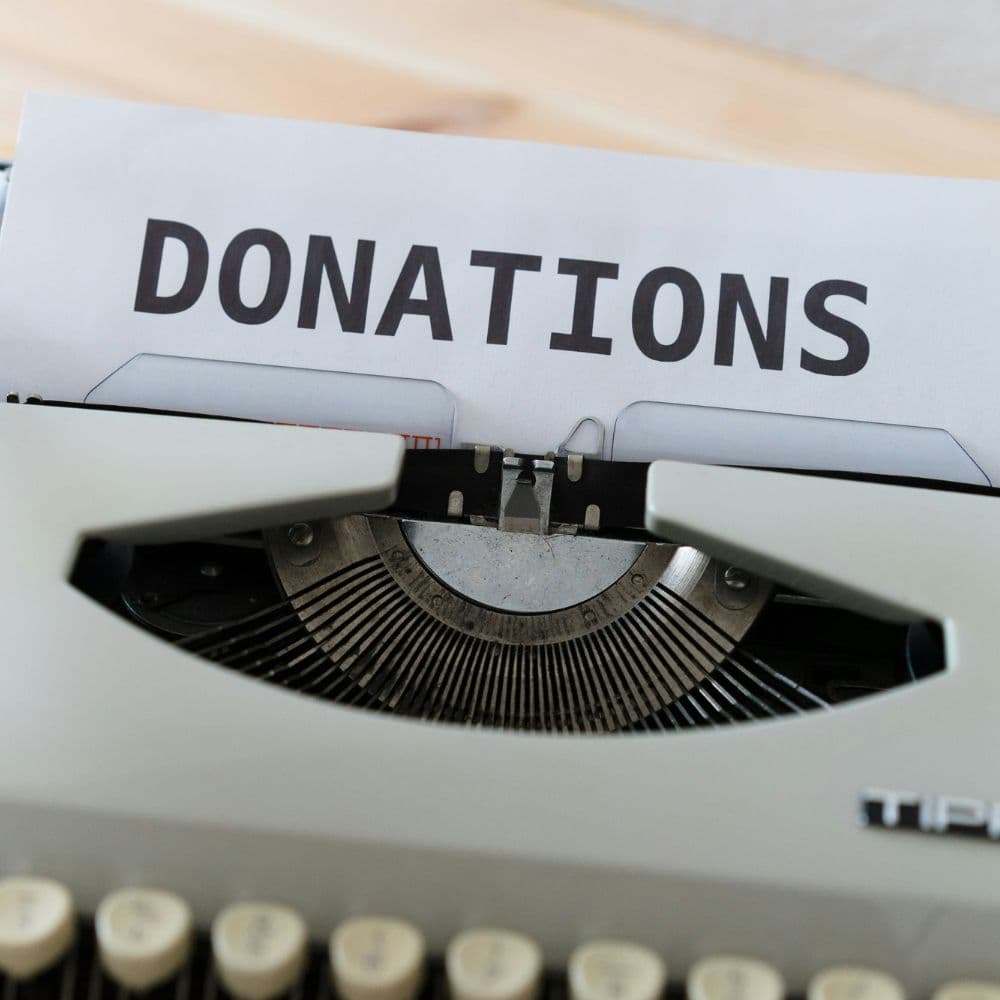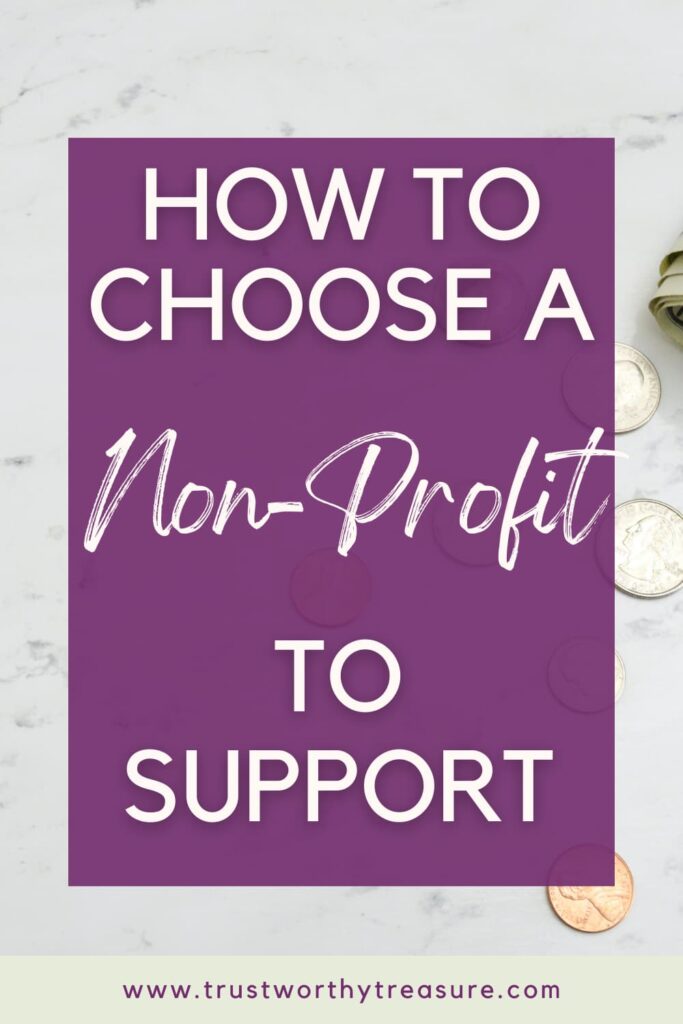What comes to mind when you think of generosity?
Think about the most generous person you know. What is their personality like? In what ways are they generous? Is that something you want to emulate
Being generous can take on many forms – providing meals for a friend in need, volunteering at a shelter, or donating money to an organization.
I’m going to talk about donating financially to a non-profit in this post. Many nonprofits have a bigger need for money so that they can have a wider impact.
While there is nothing wrong with spontaneous giving, many personal benefits and benefits to the receiving organization come from intentionally planning financial giving.
I understand that many non-profits misuse funds which leads to mistrust among all non-profits. However, there are so many nonprofits that do use funds well and are doing truly amazing work!
Today, I am going to share with you how to choose a non-profit to give to that you trust.

Navigating why it’s beneficial to you to give financially
First, let’s take a look at one of many examples in the Bible regarding finances. I love the parable of the widow’s donation because the point is not that she had “enough” to give – quite the opposite! But she had a willing heart to give financially.
Mark 12:41-44, the parable of the widow’s donation:
Jesus sat down opposite the place where the offerings were put and watched the crowd putting their money into the temple treasury. Many rich people threw in large amounts. But a poor widow came and put in two very small copper coins, worth only a few cents.
Calling his disciples to him, Jesus said, “Truly I tell you, this poor widow has put more into the treasury than all the others. They all gave out of their wealth; but she, out of her poverty, put in everything—all she had to live on.”
Amount Doesn’t Matter
For a long time, I didn’t give much financially to any organization because my thinking was “I’ll give when I have enough money”. The problem with that is no amount is “enough”. This resulted in me not giving nearly as much as I could (even though I was working full-time, living expenses were low, and had no debt) because I didn’t feel like I had enough money.
While the amount you can give will fluctuate depending on your financial season, I think the point this passage from Mark is making is that we can give more than what feels like a safe amount.
Your heart
I tend to be a pretty cold person. I generally think about the logistics of a situation before the people involved. This is a big reason why I put off charitable giving for so long. I didn’t decide to give until I got married, then it was only my husband’s leading on the issue that led us to charitable donations.
When we began giving to our church and other organizations, I was very nervous. I thought we were giving too much and this did not help my control-freakish nature with money.
I would love to say I had this massive heart change about charitable giving, but I never have. I don’t think it has made me a softer or more compassionate person, but I have come to realize that my money can have a lot of power to do good. That has been extremely encouraging to me.
In the Mark 12 passage, the widow gave a vast amount compared to what she possessed, entrusting God to provide for her.
While it may not be wise to give your entire bank account, I think this gives us the perspective that we can probably contribute a lot more than we think we can.
The benefits to others
Non-profits have beneficiaries who need the services provided to them by the organization. My guess is that just about all non-profits could be doing a lot more work if they had more funds.
How to decide if and how much to give?
This is going to be different from one person to the next. I think it ultimately comes down to a personal conviction between you and the Lord. The Bible says a lot about money – being wise with it and not letting it control our hearts.
That said, there will be seasons in your life when you can give more than at other times.
If you have consumer debt, it is wise to pay that off without taking on any more. Even if you are in this situation, I encourage you to consider giving something monthly.
Idea of tithing
Start with your local church if you aren’t giving anything at all.
I think this is a good starting point. Typically this is 10% of your salary. There is a lot of scripture surrounding the “tithe” that I won’t get into in this post.
If you have never donated money before, 10% can feel like a lot. I encourage you to start small and decide on a plan to increase giving up to 10%.
Should I donate if I’m in debt?
There are different schools of thought on this.
I think we believers should financially give, no matter where we are in our financial journey.
Debt is a result of our own decisions. However, I understand the need to limit financial giving while in a season of paying off debt.
Here’s why:
We will always have an excuse not to give. I had no debt and considered myself a committed Christian but was still only contributing a very small amount (I think it was $10/month) because I felt like I didn’t have enough money to give more.
Money is a very powerful tool, and it has a huge impact on our lives. We can be consumed by it, or we can use it for good (with many different uses in between).
Consider it, pray about an amount, and give out of your personal conviction.
How to decide a charity
Charity Navigator
Charity Navigator is a great resource to check out any nonprofit. It is an organization that rates nonprofits based on a series of criteria around how they spend their money and the impact they have on beneficiaries.
ECFA
ECFA addresses Christian organizations. Similar to Charity Navigator, it rates nonprofits on how they use their money. The biggest difference is that it only rates Christian nonprofits while Charity Navigator rates any nonprofit.
Ask your friends if they support any charities
This can be a great way to bond with a friend! It can be a fun way to connect and volunteer together if it is an organization that needs volunteers.
See if your church partners with any charities
This is a great way to be more involved in your church’s initiatives. It creates another way to pray together with people in your church.
Do you have a specific burden for an area of ministry
Maybe you are concerned for youth at risk, international ministry, or animal wellbeing.
If you feel a burden for a specific nonprofit, that may be a good indication of where to put some of your charitable contributions.
Practical Benefits
Although there are some great practical benefits, I think it’s important to give financially out of your heartfelt convictions. Looking for practical benefits defeats the purpose, though I do believe God can use any gift!
That said, here are some pretty great things about charitable giving
Good for mental health
I have read multiple articles over the years about how giving (financially or other resources) can make us as the giver feel good.
This article gives a simple explanation for why that is and the effects giving tends to have on our communities.
Not only does it make us feel good, but it can have a ripple effect that can have transformative power!
Supporting an organization that does good in the world
Giving to a charitable organization can open your eyes to the world. Whether it is an organization that helps those less fortunate close to home or abroad, receiving updates about what a relatively small amount of money can do is encouraging.
Tax Breaks
You probably have to give a fair amount to make it worth itemizing your taxes. However, charitable giving in addition to other tax breaks like loan interest, IRA contributions, etc. can add up.
Your burdens may change over time
Just because you feel strongly about a particular cause or organization today doesn’t mean that you always will. It’s okay if you want to move your money around to different organizations over the years, or if you decide to return to an organization you haven’t donated to in a while.
Take time to consider where to donate
If charitable donations are a new thing to you, take time and research where you want your money going.
It may be helpful to come up with 3-5 points that a charity needs to have for you to donate to.
This can help limit options, otherwise it may get overwhelming trying to choose a charity to support.
how much you want to be involved
There’s nothing wrong with donating a dollar here or there to a fundraiser at a checkout, but many benefits of charitable donations come from a commitment to regularly support a chosen cause.
Do you want regular updates? Do you want to partake in prayer calls?
I don’t personally get too involved, mostly because I believe in the charities I support and am confident they are using the funds I donate well. Sometimes I think I should be more involved, but that hasn’t happened…
Planning fosters generosity
Prayerfully consider how much to donate now, but also in the future. How does this fit in with your other financial goals like paying off debt or saving for a house?
Are you ready to take the next step to charitable giving? If not, what is holding you back?



